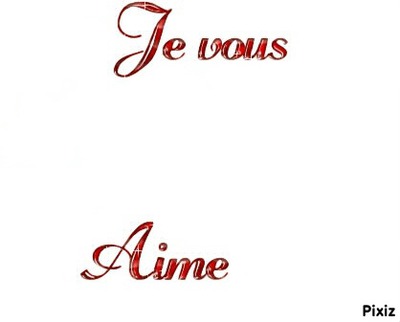French term or phrase: Je vous aime. English translation: I love you.
Also How do you use tout le monde? The expression tout le monde is used in French to refer to everyone/everybody. This expression is always singular. ATTENTION: It is never used to say the whole world, which would be le monde entier.
Likewise What is the difference between Je Vous Aime and Je T Aime? “Je vous aime “ means “I love you”, in either the formal or plural form. When spoken to someone very close, such as a child, a lover or spouse, you’ll most likely hear the informal form, “Je t’aime.” love you formally. Informally, it would be je t’aime (contraction of je tu aime).
Can you say Je T Aime?
How do you respond to Je Vous Aime?
Variations/Responses
- Moi aussi, je t’aime – I love you, too.
- Je t’adore – I adore you.
- Je vous aime – I love you (when talking to more than one person)
Is Tout le monde ILS or IL? “Tout le monde” is not really conjugated. It is a statement talking about multiple persons( plural) but is known as a singular. It is conjugated as the third person of singular if you prefer. So if we say” tout le monde va bien”( everybody is okay) , we use “va” like “il va”.
What is the meaning of the French word tout? Tout, tous, toute, toutes = Everything, all (of them), whole.
What pronoun is used for tout le monde? French indefinite pronouns
| Masculine | |
|---|---|
| soi | oneself |
| tel | someone, anyone |
| tout | everything |
| tout le monde | everyone |
What is meaning of je t’aime aussi?
Merci, je t’aime aussi. THANK YOU, I LOVE YOU, TOO.
What is je t adore? Translation of “je t’adore” in English. I love you I adore you I like you. I worship you.
What are you doing pronounce in French?
Salut, que faites-vous ici ? Hi, what are you doing? Salut, tu fais quoi ?
What is mon Cherie? The expression mon chéri remains common in French today. Sometime in in the mid-1800s, cheri (usually without the accent) entered English for “a sweet young woman.” Mon cheri to mean “my darling” or “my sweetheart” appears in English-language publications around that time to reflect the speech of French.
What is C est la vie?
It means ‘such is life’ or ‘that’s life’. When things don’t go according to plan, some people complain non-stop; while others accept the fact that disappointments are a part of life and get on with it. The expression ‘c’est la vie’ is mostly used to downplay your sense of disappointment.
What’s your name is French?
If you’d like to say “What is your name?” in French, you generally have two options. To pose the question formally, you’d say “Comment vous-appelez vous? Speaking informally, you can simply ask “Comment t’appelles-tu?”
Can Je T Aime mean I like you? “Je t’aime” does literally mean “I love you”. The three French words in the sentence are Je (I), te (you) and aime (the conjugation of aimer (love) for je).
Is Parler avoir or etre? To form it for parler, you will use the auxiliary verb avoir along with the past participle parlé.
Is voir avoir or etre?
The present participle of voir is voyant. To form the passé composé of voir, you will need the auxiliary verb avoir and the past participle vu.
Is Ma Famille singular or plural? “Ma famille est restée” is 100% correct. It is a feminine singular noun (La famille). The plural form would be “Mes familles” (My families) but just like in English, we only have one family. Hence the singular form.
What are the forms of Tout?
As a pronoun, tout means all, everything, or everyone. It only has 3 different forms: tout, tous, and toutes.
What’s the difference between Tous and tout? As you might guess, the word tout is masculine and singular. That means it is used when it modifies masculine, singular words. Consequently, tout becomes tous when modifying masculine plural forms, and toute and toutes modify feminine singular and feminine plural forms, respectively.
What are the different forms of tout in French?
Tout, toute, tous, toutes
| singular | plural | |
|---|---|---|
| masculine | tout | tous |
| feminine | toute | toutes |
What are French indefinite pronouns? French Indefinite Pronoun
Indefinite pronouns refer to people or things without saying exactly who or what they are. They are vague or “not definite” because they do not refer to any specific person, thing or amount.
What are the indefinite articles in French?
The French indefinite articles are une for feminine nouns, un for masculine nouns, and des for plural nouns.
What are the definite articles in French? 4 Using the definite article. The definite article in French (le, la, l’ and les) is used in more or less the same way as we use the in English, but it is also used in French in a few places where you might not expect it.
Do’t forget to share this post !
